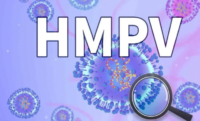When it comes to respiratory illness, we may have heard much about the flu or the common cold, but what about the human metapneumovirus (hMPV)? As the lesser-known virus is indeed a significant player in the world of respiratory infections, understanding its ways can definitely keep us even healthier, more so during the peak seasons of illness. In this article, we’ll be able to gain detailed knowledge on: What is human metapneumovirus, and what are its symptoms?
What is hMPV virus?

A human metapneumovirus is the type of virus that mainly involves the respiratory system. This virus, which was identified for the first time in the year 2001, forms a part of the Pneumoviridae virus family, which is more closely related to respiratory syncytial virus (RSV). This particular virus may have been spreading within humans over decades while this virus is keeping silent amidst causing respiratory-related illnesses across the world.
This virus is highly contagious and spreads through respiratory droplets, much like the common cold or flu. It can affect people of all ages but is most common in young children, older adults, and individuals with weakened immune systems.
Symptoms of HMPV

Symptoms of HMPV typically resemble those of the common cold and may include:
- Cough
- Fever
- Nasal congestion
- Shortness of breath
If you are experiencing these types of problems now, do not take it lightly. In some cases, especially among young children, older adults, and immunocompromised individuals, HMPV can progress to more severe respiratory conditions like bronchitis or pneumonia, so whenever you feel like a little symptom of HMPV, take precautions and checkup yourself with the doctor as soon as possible.
Treatment Options
Currently, there are no specific antiviral medications for HMPV disease. Treatment primarily focuses on relieving symptoms and supporting the body’s recovery.
- Rest: Ensure enough rest to help the body heal.
- Hydration: Drink plenty of water and beverages to stay hydrated.
- Over-the-counter medications: Use pain relievers like acetaminophen and ibuprofen or paracetamol to alleviate fever and discomfort.
If symptoms get worse or you are part of a high-risk group, see a doctor for further evaluation.
To reduce the risk of contracting HMPV:
- Hand hygiene: Wash hands frequently with soap or handwash with water.
- Avoid close contact: Stay at a distance from individuals showing respiratory symptoms.
- Cover coughs and sneezes: Use a tissue, hanky, or your elbow to cover your mouth and nose.
- Disinfect surfaces: Regularly clean commonly touched surfaces.
These practices are especially important during peak respiratory illness seasons, as we took the precautions during COVID-19 to stay yourself healthy and saved from others.
Recent Development about the hMVP
In early January 2025, a surge in HMPV cases was reported in China, particularly affecting children under 14. Hospitals have been overwhelmed, leading to public concern reminiscent of the early COVID-19 pandemic. Health experts emphasize that HMPV is not as threatening as COVID-19 due to existing knowledge and partial immunity, and cases may increase very fast if we don’t take precautions.
Recent Development About hMPV in India
In January 2025, India reported its first confirmed cases of human metapneumovirus (hMPV), creating a buzz among health officials and the public. According to the Indian Council of Medical Research (ICMR), seven individuals tested positive for the virus in Mumbai, Maharashtra, including two infants who are currently recovering under medical supervision.
Conclusion
While HMPV is a common respiratory virus, understanding its symptoms, treatment options, and preventive measures can help manage and reduce its impact. Staying informed and practicing good hygiene are key steps in protecting yourself and others.






